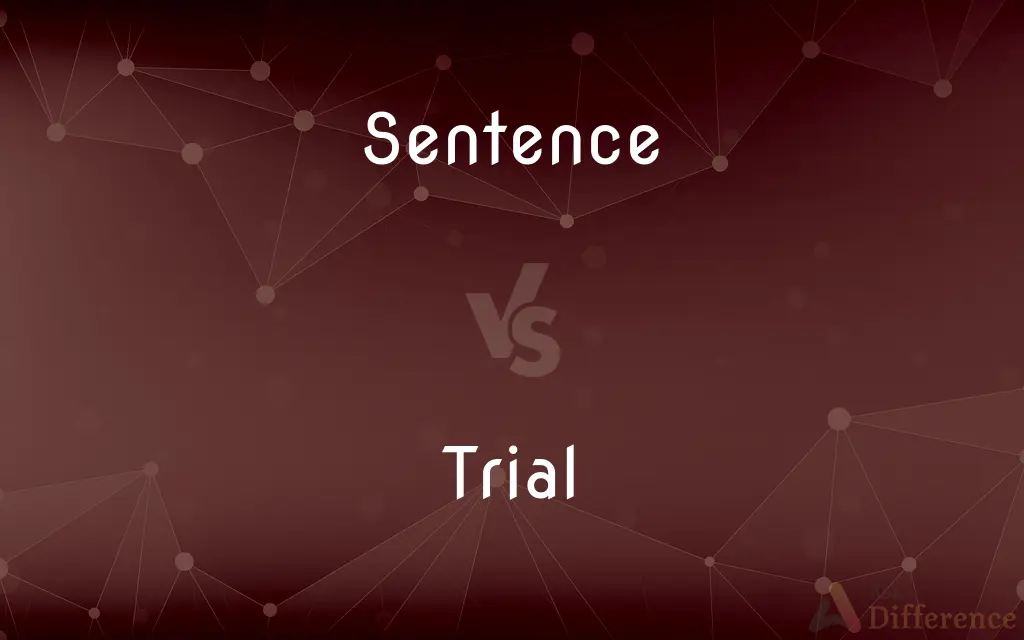Sentence vs. Trial — What's the Difference?
By Tayyaba Rehman & Maham Liaqat — Updated on April 6, 2024
A sentence is the punishment given to a defendant found guilty, while a trial is the process of determining guilt.

Difference Between Sentence and Trial
Table of Contents
ADVERTISEMENT
Key Differences
A trial is a legal process in which evidence is presented before a judge (and sometimes a jury) to determine whether the defendant is guilty of the charges against them. In contrast, a sentence is the penalty imposed on the defendant after being found guilty, which can range from fines and community service to imprisonment.
During a trial, both the prosecution and defense present their cases, including evidence and witness testimonies, to establish the guilt or innocence of the defendant. Whereas, the sentence is decided by the judge after a verdict of guilt, based on legal guidelines, the severity of the crime, and other factors.
Trials are conducted according to strict legal procedures, aiming to ensure fairness and justice in the adjudication process. On the other hand, sentencing follows the conviction and is influenced by legal statutes, judicial discretion, and sometimes sentencing guidelines or recommendations.
The purpose of a trial is to provide a fair and impartial venue for resolving disputes over criminal charges, ensuring that the defendant's rights are protected. In contrast, the purpose of a sentence is to punish the guilty, deter future crimes, and rehabilitate offenders, reflecting society's response to criminal behavior.
While trials can be jury trials or bench trials (decided by a judge alone), depending on the legal system and the nature of the case, sentencing is always determined by a judge. This highlights the different roles played by the judiciary and, in some cases, the jury, in the criminal justice process.
ADVERTISEMENT
Comparison Chart
Definition
Legal process to determine guilt or innocence.
Punishment given after a guilty verdict.
Key Participants
Judge, jury (sometimes), attorneys, defendant.
Judge, sometimes the defendant and attorneys.
Purpose
To establish guilt or innocence.
To punish and deter criminal behavior.
Outcome
Verdict (guilty or not guilty).
Specific punishment (fine, prison, etc.).
Legal Framework
Governed by procedural law.
Determined by sentencing guidelines/laws.
Compare with Definitions
Sentence
A judicial determination of the penalty for a crime.
The court's sentence aimed to serve both justice and rehabilitation.
Trial
A formal examination of evidence in a court.
The trial lasted three weeks before the jury reached a verdict.
Sentence
The outcome of the judicial process regarding penalties.
After a lengthy trial, the sentence was finally announced.
Trial
A proceeding to resolve accusations against a defendant.
The trial provided a platform for both sides to present their case.
Sentence
Legal consequence imposed on a convicted individual.
Her sentence included community service in addition to a fine.
Trial
The judicial process of determining guilt.
His trial was marked by intense media coverage.
Sentence
The final judgment determining a convicted person's punishment.
The sentence reflected the severity of the offense.
Trial
The process where a judge and possibly a jury review evidence.
The trial concluded with a guilty verdict for the defendant.
Sentence
The punishment assigned to a defendant found guilty by a court.
The judge handed down a five-year sentence for the crime.
Trial
A legal mechanism for adjudicating criminal charges.
The trial revealed complexities in the case that weren't initially apparent.
Sentence
A grammatical unit that is syntactically independent and has a subject that is expressed or, as in imperative sentences, understood and a predicate that contains at least one finite verb.
Trial
In law, a trial is a coming together of parties to a dispute, to present information (in the form of evidence) in a tribunal, a formal setting with the authority to adjudicate claims or disputes. One form of tribunal is a court.
Sentence
The penalty imposed by a law court or other authority upon someone found guilty of a crime or other offense.
Trial
A formal examination of evidence by a judge, typically before a jury, in order to decide guilt in a case of criminal or civil proceedings
The editor was summoned to stand trial for libel
The newspaper accounts of the trial
Sentence
(Archaic) A maxim.
Trial
A test of the performance, qualities, or suitability of someone or something
Clinical trials must establish whether the new hip replacements are working
Sentence
(Obsolete) An opinion, especially one given formally after deliberation.
Trial
A person, experience, or situation that tests a person's endurance or forbearance
The trials and tribulations of married life
Sentence
To impose a sentence on (a criminal defendant found guilty, for example).
Trial
Test (something, especially a new product) to assess its suitability or performance
Teachers all over the UK are trialling the materials
Sentence
(dated) The decision or judgement of a jury or court; a verdict.
The court returned a sentence of guilt in the first charge, but innocence in the second.
Trial
(of a horse, dog, or other animal) compete in trials
The pup trialled on Saturday
Sentence
A punishment imposed on a person convicted of a crime.
Trial
A proceeding in which opposing parties in a dispute present evidence and make arguments on the application of the law before a judge or jury
The case is expected to go to trial.
Sentence
(obsolete) A saying, especially from a great person; a maxim, an apophthegm.
Trial
An instance of such a proceeding
The trial of Socrates.
Sentence
(grammar) A grammatically complete series of words consisting of a subject and predicate, even if one or the other is implied, and typically beginning with a capital letter and ending with a full stop or other punctuation.
The children were made to construct sentences consisting of nouns and verbs from the list on the chalkboard.
Trial
The act or process of testing, trying, or putting to the proof
A trial of one's faith.
Sentence
(logic) A formula with no free variables.
Trial
An instance of such testing, especially as part of a series of tests or experiments
A clinical trial of a drug.
Sentence
(computing theory) Any of the set of strings that can be generated by a given formal grammar.
Trial
An effort or attempt
Succeeded on the third trial.
Sentence
(obsolete) Sense; meaning; significance.
Trial
A state of pain or anguish that tests patience, endurance, or belief
"the fiery trial through which we pass" (Abraham Lincoln).
Sentence
(obsolete) One's opinion; manner of thinking.
Trial
A trying, troublesome, or annoying person or thing
The child was a trial to his parents.
Sentence
A pronounced opinion or judgment on a given question.
Trial
A preliminary competition or test to determine qualifications, as in a sport.
Sentence
To declare a sentence on a convicted person; to condemn to punishment.
The judge sentenced the embezzler to ten years in prison, along with a hefty fine.
Trial
Of, relating to, or used in a trial.
Sentence
To decree, announce, or pass as a sentence.
Trial
Attempted or advanced on a provisional or experimental basis
A married couple on a trial separation.
Sentence
(obsolete) To utter sententiously.
Trial
Made or done in the course of a trial or test.
Sentence
Sense; meaning; significance.
Tales of best sentence and most solace.
The discourse itself, voluble enough, and full of sentence.
Trial
An opportunity to test something out; a test.
They will perform the trials for the new equipment next week.
Sentence
An opinion; a decision; a determination; a judgment, especially one of an unfavorable nature.
My sentence is for open war.
That by them [Luther's works] we may pass sentence upon his doctrines.
Trial
Appearance at judicial court in order to be examined.
Sentence
A philosophical or theological opinion; a dogma; as, Summary of the Sentences; Book of the Sentences.
Trial
A difficult or annoying experience, such an experience seen as a test of faith and piety
That boy was a trial to his parents.
Sentence
In civil and admiralty law, the judgment of a court pronounced in a cause; in criminal and ecclesiastical courts, a judgment passed on a criminal by a court or judge; condemnation pronounced by a judicial tribunal; doom. In common law, the term is exclusively used to denote the judgment in criminal cases.
Received the sentence of the law.
Trial
A tryout to pick members of a team.
Soccer trials
Sentence
A short saying, usually containing moral instruction; a maxim; an axiom; a saw.
Trial
(ceramics) A piece of ware used to test the heat of a kiln.
Sentence
A combination of words which is complete as expressing a thought, and in writing is marked at the close by a period, or full point. See Proposition, 4.
He fills, he bounds, connects, and equals all.
A king . . . understanding dark sentences.
Trial
(UK) An internal examination set by Eton College.
Sentence
To pass or pronounce judgment upon; to doom; to condemn to punishment; to prescribe the punishment of.
Nature herself is sentenced in your doom.
Trial
Pertaining to a trial or test.
Sentence
To decree or announce as a sentence.
Trial
Attempted on a provisional or experimental basis.
Sentence
To utter sententiously.
Trial
Characterized by having three (usually equivalent) components.
Sentence
A string of words satisfying the grammatical rules of a language;
He always spoke in grammatical sentences
Trial
Triple.
Sentence
(criminal law) a final judgment of guilty in a criminal case and the punishment that is imposed;
The conviction came as no surprise
Trial
(grammar) Pertaining to a language form referring to three of something, like people; contrast singular, dual and plural. (See Ambai language for an example.)
No language has a trial number unless it has a dual.
Sentence
The period of time a prisoner is imprisoned;
He served a prison term of 15 months
His sentence was 5 to 10 years
He is doing time in the county jail
Trial
To carry out a series of tests on (a new product, procedure etc.) before marketing or implementing it.
The warning system was extensively trialed before being fitted to all our vehicles.
Sentence
Pronounce a sentence on (somebody) in a court of law;
He was condemned to ten years in prison
Trial
To try out (a new player) in a sports team.
The team trialled a new young goalkeeper in Saturday's match, with mixed results.
Trial
The act of trying or testing in any manner.
Trial
Any effort or exertion of strength for the purpose of ascertaining what can be done or effected.
[I] defy thee to the trial of mortal fight.
Trial
The state of being tried or tempted; exposure to suffering that tests strength, patience, faith, or the like; affliction or temptation that exercises and proves the graces or virtues of men.
Others had trial of cruel mockings and scourgings.
Trial
The act of testing by experience; proof; test.
Repeated trials of the issues and events of actions.
Trial
That which tries or afflicts; that which harasses; that which tries the character or principles; that which tempts to evil; as, his child's conduct was a sore trial.
Every station is exposed to some trials.
Trial
Examination by a test; experiment, as in chemistry, metallurgy, etc.
Trial
The formal examination of the matter in issue in a cause before a competent tribunal; the mode of determining a question of fact in a court of law; the examination, in legal form, of the facts in issue in a cause pending before a competent tribunal, for the purpose of determining such issue.
Trial
(law) legal proceedings consisting of the judicial examination of issues by a competent tribunal;
Most of these complaints are settled before they go to trial
Trial
The act of testing something;
In the experimental trials the amount of carbon was measured separately
He called each flip of the coin a new trial
Trial
(sports) a preliminary competition to determine qualifications;
The trials for the semifinals began yesterday
Trial
(law) the determination of a person's innocence or guilt by due process of law;
He had a fair trial and the jury found him guilty
Trial
Trying something to find out about it;
A sample for ten days free trial
A trial of progesterone failed to relieve the pain
Trial
An annoying or frustrating or catastrophic event;
His mother-in-law's visits were a great trial for him
Life is full of tribulations
A visitation of the plague
Trial
The act of undergoing testing;
He survived the great test of battle
Candidates must compete in a trial of skill
Common Curiosities
Who decides the sentence in a criminal case?
The judge decides the sentence, sometimes within the framework of mandatory sentencing guidelines.
What factors influence sentencing?
Factors include the crime's severity, the defendant's criminal history, statutory guidelines, and mitigating or aggravating circumstances.
How do legal systems ensure fair trials?
Through procedural safeguards, the right to legal representation, the presumption of innocence, and other legal rights.
What happens if a trial ends in a not guilty verdict?
If a trial ends in a not guilty verdict, the defendant is acquitted of the charges and released without a sentence.
What's the difference between parole and sentencing?
Sentencing is the imposition of a penalty, while parole is the conditional release of a prisoner before completing their sentence.
How is a life sentence determined?
A life sentence is typically reserved for the most serious crimes, determined by the judge based on legal guidelines.
Are all trials public?
Most trials are public, but there can be exceptions for protecting victims, national security, or ensuring a fair trial.
Can a trial be without a jury?
Yes, in many legal systems, there are bench trials where the judge alone determines guilt and issues a sentence.
Can a sentence be appealed?
Yes, sentences can often be appealed in higher courts if there are grounds to believe the sentence was unjust or procedural errors occurred.
Is a trial always necessary for a sentence?
Not always; sentences can follow guilty pleas without a full trial.
Can a sentence include rehabilitation programs?
Yes, sentences can include participation in rehabilitation programs, especially for non-violent offenders.
What is a suspended sentence?
A suspended sentence is a punishment that is not immediately enforced, allowing the defendant to serve probation instead.
What ensures a sentence is proportional to the crime?
Legal guidelines, precedents, and judicial discretion aim to ensure sentences are proportional to the nature and severity of the crime.
Why are some trials by jury and others by judge?
This can depend on the legal system, the nature of the crime, and the defendant's choice in some jurisdictions.
What role do victims play in sentencing?
Victims may impact sentencing through victim impact statements, though the judge ultimately decides the sentence.
Share Your Discovery

Previous Comparison
Homework vs. Classwork
Next Comparison
Ken vs. KennethAuthor Spotlight
Written by
Tayyaba RehmanTayyaba Rehman is a distinguished writer, currently serving as a primary contributor to askdifference.com. As a researcher in semantics and etymology, Tayyaba's passion for the complexity of languages and their distinctions has found a perfect home on the platform. Tayyaba delves into the intricacies of language, distinguishing between commonly confused words and phrases, thereby providing clarity for readers worldwide.
Co-written by
Maham Liaqat













































